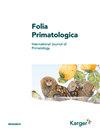Conservation education initiatives for elementary school students at La Suerte Biological Research Station, Costa Rica
IF 1.2
4区 生物学
Q2 ZOOLOGY
引用次数: 0
Abstract
Maderas Rainforest Conservancy (MRC) is a conservation non-profit organization that protects forests, offers primate field schools, and leads community outreach initiatives at sites in Central America, including La Suerte Biological Research Station (LSBRS) in Costa Rica. In 2018, MRC started Aula Verde, a conservation education initiative for elementary school students aged 5-12 at LSBRS. Groups of children from elementary schools and communities located within 50 km have visited LSBRS from 2018-2023 to participate in the 1.5-2 hour Aula Verde workshop, which consists of (1) an interactive lecture on conservation, (2) a guided forest walk, and (3) a snack, gift bag, and tree seedling for each participant. Workshops are funded by international donations to MRC and cost US $8-16 per student. Aula Verde has been successful, with multiple schools and communities making repeat visits, students’ families beginning to recycle their garbage and joining a WhatsApp group about conservation education that MRC staff initiated and lead, and teachers reporting improved learning outcomes for students who participate in the workshops. The success of Aula Verde is largely due to the ecological expertise and strong community ties of LSBRS staff. While the COVID-19 pandemic decreased Aula Verde offerings from 2020-2023, we expect workshops to resume at full capacity in 2024. In the future, MRC hopes to expand Aula Verde’s outreach to all children aged 5-12 living within 50 km of LSBRS.哥斯达黎加 La Suerte 生物研究站的小学生保护教育活动
马德拉斯雨林保护协会(Maderas Rainforest Conservancy,简称 MRC)是一家非营利性保护组织,致力于保护森林、开办灵长类野外学校,并在中美洲的多个地点(包括哥斯达黎加的拉苏埃尔特生物研究站(La Suerte Biological Research Station,简称 LSBRS))开展社区外联活动。2018 年,MRC 在 LSBRS 启动了一项针对 5-12 岁小学生的保护教育活动 Aula Verde。从 2018 年到 2023 年,来自 50 公里范围内的小学和社区的儿童团体参观了 LSBRS,参加了 1.5-2 小时的 Aula Verde 讲习班,内容包括:(1)关于保护的互动讲座;(2)有导游带领的森林漫步;(3)为每位参与者提供点心、礼品袋和树苗。讲习班的经费来自国际社会对 MRC 的捐款,每位学生的费用为 8-16 美元。Aula Verde 活动取得了成功,多所学校和社区重复参加,学生家庭开始回收垃圾,并加入了由 MRC 工作人员发起和领导的关于保护教育的 WhatsApp 群组,教师们也报告说参加讲习班的学生学习成绩有所提高。Aula Verde 的成功在很大程度上归功于 LSBRS 工作人员的生态专业知识和强大的社区联系。虽然 COVID-19 大流行减少了 2020-2023 年的 "绿色学校 "课程,但我们预计 2024 年将恢复全部课程。未来,研究中心希望将 "绿色学校 "的服务范围扩大到生活在LSBRS 50公里范围内的所有5-12岁儿童。
本文章由计算机程序翻译,如有差异,请以英文原文为准。
求助全文
约1分钟内获得全文
求助全文
来源期刊

Folia Primatologica
生物-动物学
CiteScore
3.30
自引率
10.50%
发文量
36
审稿时长
>12 weeks
期刊介绍:
Recognizing that research in human biology must be founded on a comparative knowledge of our closest relatives, this journal is the natural scientist''s ideal means of access to the best of current primate research. ''Folia Primatologica'' covers fields as diverse as molecular biology and social behaviour, and features articles on ecology, conservation, palaeontology, systematics and functional anatomy. In-depth articles and invited reviews are contributed by the world’s leading primatologists. In addition, special issues provide rapid peer-reviewed publication of conference proceedings. ''Folia Primatologica'' is one of the top-rated primatology publications and is acknowledged worldwide as a high-impact core journal for primatologists, zoologists and anthropologists.
 求助内容:
求助内容: 应助结果提醒方式:
应助结果提醒方式:


